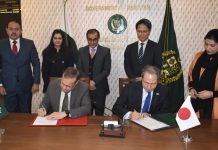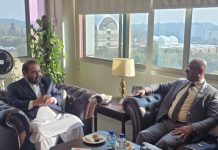ISLAMABAD: A Roundtable Discussion on “Illicit Tobacco Trade” Need for Implementation of Law & Regulatory Regimes” was organized by Center for Global and Strategic Studies (CGSS), Islamabad on Wednesday.
The discussion commenced with the opening remarks of Major General Hafiz Masroor Ahmed (Retd), Vice President, Center for Global and Strategic Studies (CGSS), Islamabad. He stated that today, we have gathered to discuss an important issue. A lot of studies have been conducted on this issue and its shows that the impact of illicit tobacco trade is enormous in terms of revenue. In our current policy, many new initiatives are being incorporated to tackle this issue.
Ms. Maryam Raza, Research Associate, CGSS gave an introductory presentation on the subject. She said that according to a report by IPSOS there are five major sectors in Pakistan due to which the tax evasion ratio is high. 65% of all tyres in Pakistan are smuggled. Small traders who hold 40-50% market share contribute massively to tax evasion. Real estate in Pakistan is where the tax evaded/black money gets parked. Counterfeit medical drugs and illegally smuggled medicines have been the biggest challenge for law-enforcement agencies to combat. Tax evasion is carried out through the illegal trade of tobacco and has three main strands, each having its own estimation of losses to national exchequer and additional violations of several other laws in the country.
Mohammad Jehanzeb Khan, Deputy Chairman, Planning Commission of Pakistan was the Guest of Honor at the occasion. Hecommended CGSS for organizing this timely discussion. He stated that today, we will bring to spotlight, the important public policy matters. He stated that being multidimensional, this matter is of great significance. He stated that there have been a lot ofcampaigns to highlight this issue at both national and international level. The aim of these campaigns was to limit the use of tobacco rather to completely eliminate it. He further added that in recent times, we have not seen any significant decrease in the in the illicit tobacco trade. The key element and question is the ability to enforce and curb tax evasion and illicit tobacco availability and the enforcement structure of the country. Other mechanisms other than pricing are also being worked out to tackle this issue. In terms of Pakistan, the policy must be relooked in a proper structured manner and must be long-term.
Mr. Zahid Latif, Chairman, Islamabad Stock Exchange stated that only two tobacco companies pay 98 percent of total tax tobacco collection. The remaining 40 percent companies pay a meagre two percent tax. In last twenty years, nothing concrete have been done to curb this issue. This subject leads to subjects like smuggling and loss of revenue.
Dr. Ikram Ghani, Former Chairman Pakistan Tobacco Boardstated that there is no denying that in Pakistan, today illicit tobacco trade is on the rise. The price differential between the duty paid and local NDP cigarettes is leading to a further inclination towards consumption of illegally produced cigarettes. Today 40% of cigarettes sold in the country are illicit. – PR






